24 Hours Hotline: +86 137-3541-1378
Email:beijing@tripstoshanghai.com
24 Hours Hotline: +86 137-3541-1378
Email:beijing@tripstoshanghai.com
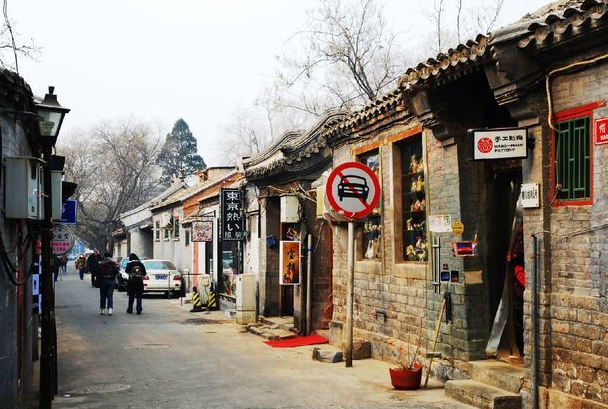
Introduction
Hutong refers to lanes and alleys between the Siheyuan (courtyard with buildings on four sides) residences in Beijing, spreading over every corner of the old city. The dotted hutongs are unique scenery in Beijing profoundly related to the Siheyuan, which, together outlining the casual and charming life of the common people in the old city.
The hutongs of various sizes in Beijing reached as many as 7000-odd in number, each featuring an anecdote or story. A variety of names are given to the hutongs, some named after a figure, such as the Wen Chengxiang Lane (the Lane of Grand Councilor Wen), some after a marketplace or commodity, such as the Goldfish Lane, or named according to the Beijing dialect, such as the Menhuluguan Lane (the Lane of Piggy Bank) etc.
History & Background
Hutongs first appeared in the Yuan Dynasty (1271-1368) after the original city was destroyed during a war. Most of the hutongs still in existence today date from the Ming (1368 - 1644) and Qing (1644 - 1911) dynasties.
However, still possible to find some from the Yuan Dynasty. For instance, the Zhuanta Hutong on Xisi in the west of the city is one such ancient hutong. In dramas written during the Yuan period, the Zhuanta Hutong is often mentioned. The area was also the home of famous playwright Guan Hanqing, China's Shakespeare of the Yuan Dynasty.
Hutong is a transliteration from Mongolian bearing the meaning of walking ground, which has been passed down ever since the construction of Dadu (the capital of Yuan Dynasty, today’s Beijing) in 1267. The old hutongs, the fruit of the ancient history of Beijing, have existed for over 700 years till now. After a world of changes through centuries, they have become a symbol of life for People in Beijing, there are thousands of hutongs in the city.
The oldest hutong in Beijing is called Sanmiao Street. It enjoys a history of more than 900 years! The longest one is the Dongxi Jiaomin Lane with a length of 6.5 li, while the shortest is merely a dozen meters. The narrowest one shall be the Qianshi Lane in Dashilan’er area of Qianmen, which is as narrow as 0.7 meter.
Top 10 Must-See Hutongs in Beijing
Nanluoguxiang Hutong
Located several kilometers north of the Forbidden City and just east of Houhai Lake is Nanluoguxiang, an 800-meter long north-south alleyway filled with cafes, bars, and shops all designed in classical Chinese 'hutong' style.
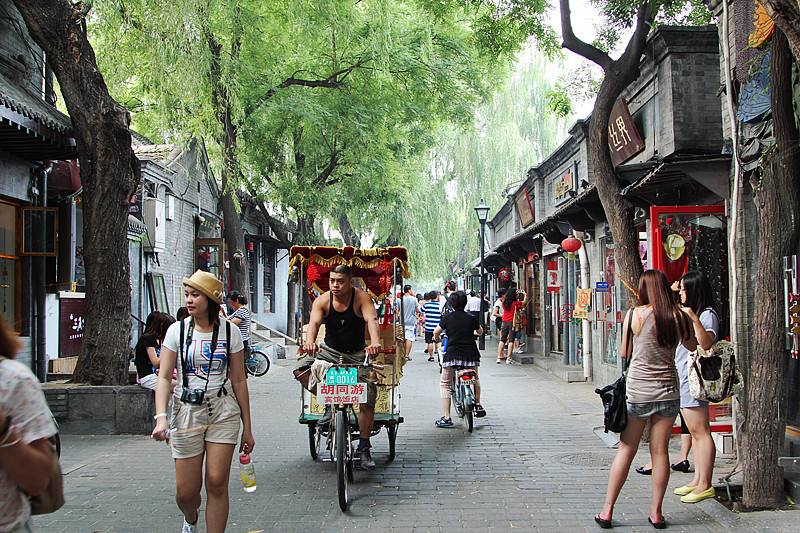
This heavily renovated hutong is a heaven for backpackers. Popular spots include the Passby Bar(Western and Chinese food, gin and tonics, lovely courtyard atmosphere).
Travel Tips:
Adress: Dongcheng District
Transportation: Bus 5, 60, 82, 107, 124 to Gulou, or bus 13, 118, 612, 823 to Luoguxiang.
Surrounding attractions: Houhai Lake, Shichahai Lake, Gongwangfu Garden
Yandaixie Street
Yandaixie Street, literally meaning "Skewed Tobacco Pouch Street", is located in the north of Xicheng district. The 232-meter-long street starts from Di'anmen Avenue in the east and ends at Shichahai Lake in the west. The street originally got its name due to its shape, which resembles a huge tobacco pouch. During the Qing Dynasty (1644-1911), many tobacco stores opened there. Today, visitors wandering along the street still can find many stores selling tobacco pouches, antiques and all kinds of souvenirs.
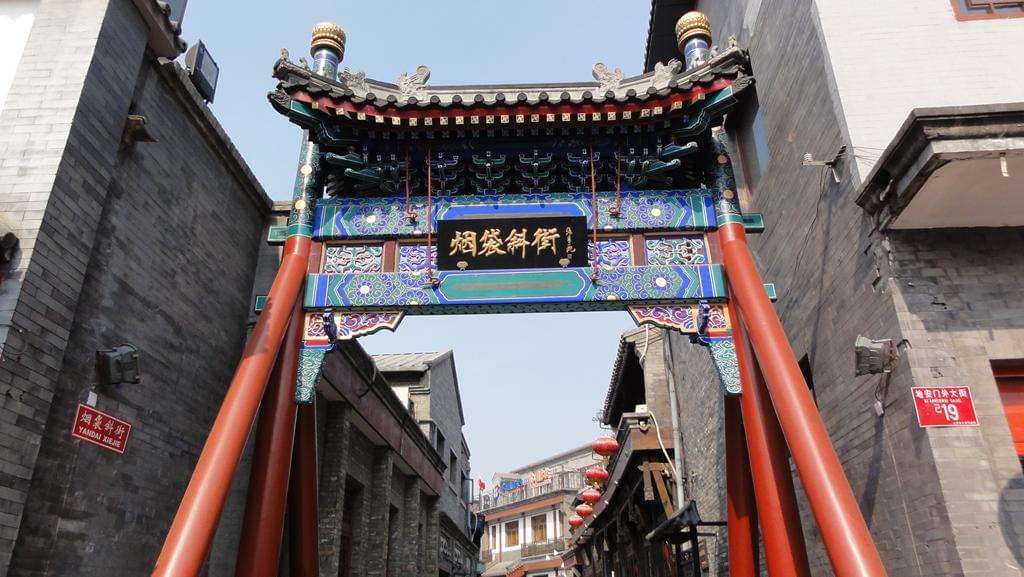
Travel Tips:
Adress: Di'anmenwai Avenue, Xicheng District, Beijing
Transportation: Bus 5, 60, 82, 107, 124 to Gulou or Take Subway Line 2 to Gulou dajie
Surrounding attractions: Drum Tower, former residence of Guo Moruo
Mao'er Hutong
Mao'er Hutong is an interesting place because of its location, hidden in plain sight and in close proximity to well-known places, plus the fact there are four spots on this one alleyway identified as cultural relics none of which are officially open to the public.
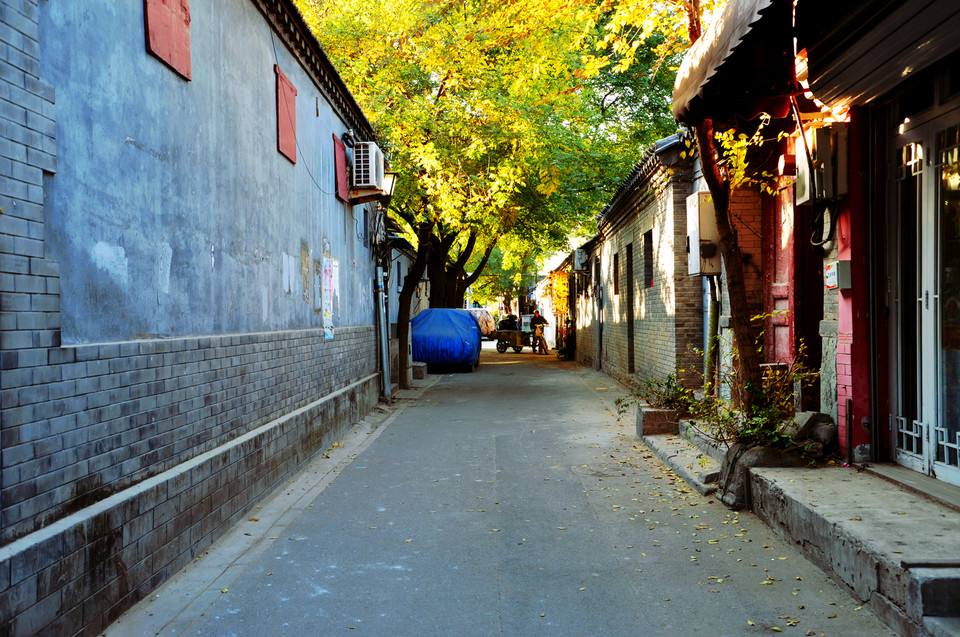
The area dates from the Ming Dynasty (1368-1644) when it was called the Wenchang Gong, a Taoist temple honouring the spirit belonging to the sixth of China's 28 constellations. The current name came into usage during the succeeding Qing Dynasty (1644-1911). The hutong runs west to east from Di'anmenwai Dajie to Nanluogu Xiang in the Jiaodaokou sub-district. The best way to find it is from Di'anmen; it's the first alleyway northeast of the old bridge to the east of Qianhai.
Travel Tips:
Adress: Dongcheng District
Transportation: Bus 13, 42, 118, 612, 623, 701 to Di’anmendong
Surrounding attractions: Nanluoguxiang, former residence of Mao Dun
Guozijian Street
Guozijian Street is a street in Dongcheng District. It is listed as an important historical site, dating to 1306, and a Temple of Confucius, built in 1302, are located in this street. The Yonghe Temple is located next to its east entrance. It is the only hutong in Beijing to feature ancient archways.
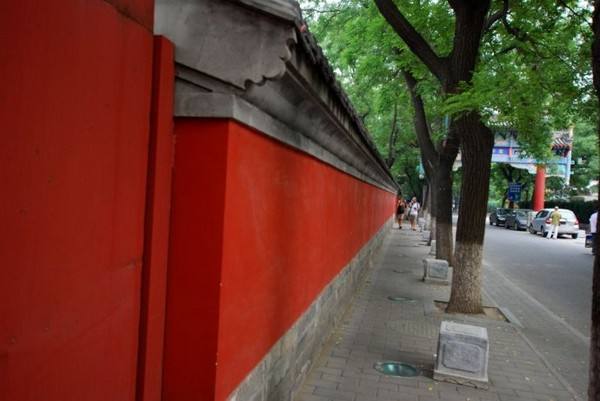
The street gets its name from the Guozijian House, which is the home of the Imperial College during the Yuan (1206–1368), Ming (1368-1644) and Qing (1644-1911) dynasties. Now, visitors still can find many interesting antique stores, tea houses and traditional shops on the street. And because the street lies next to the Lama Temple, the perfumed scent of burning incense fills the air, making the street seem both classical and mysterious.
Travel Tips:
Adress: Northwest of Dongcheng District
Transportation: Bus 13, 684 to Guozijian, or bus 116, 117 to Yonghegong
Surrounding attractions: Yonghegong Lama Temple, Guozijian House
Liulichang Street
The Liulichang Street of Chinese Culture is a 750 meter long collection of all kinds of Calligraphy, art, antiques and paintings that China has to offer. The street is a hubbub of China's culture and one is totally taken in by the aura surrounding it. Located south of the Peace gate in Beijing the street is a favorite with tourists.
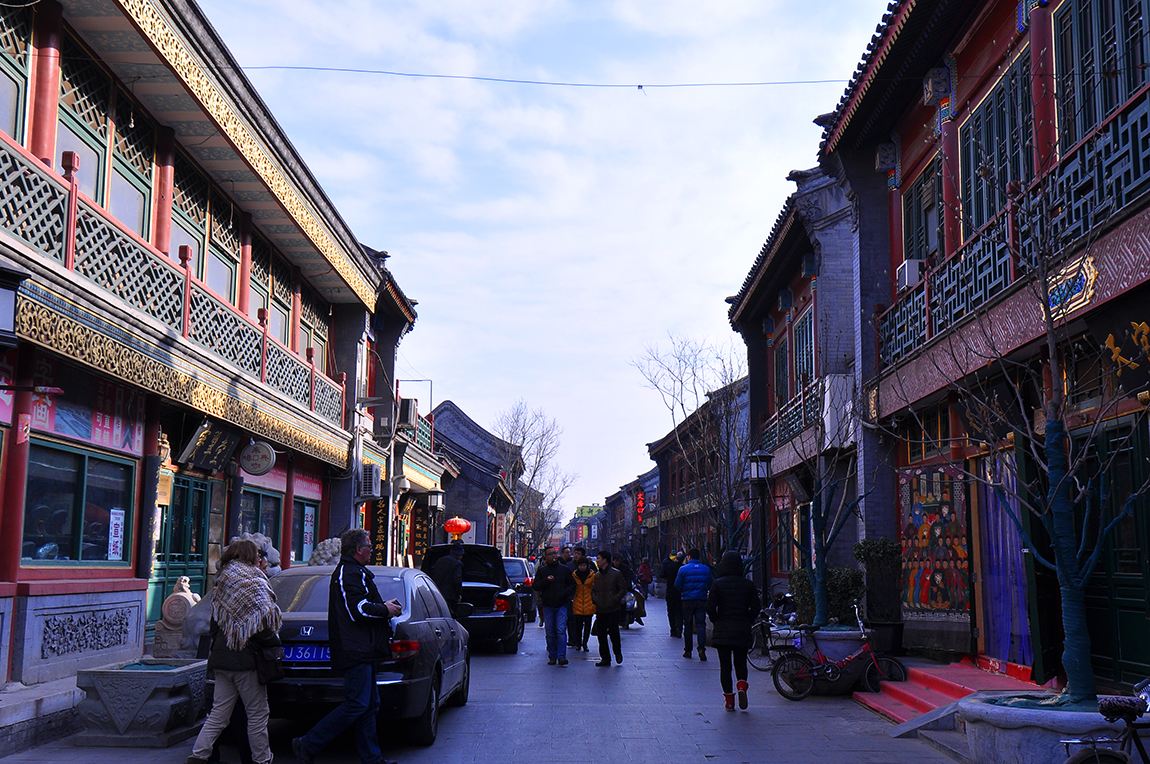
Merchants race to their doors with a welcoming "hello, hello" for all their customers, but they all rack their brains to attract foreigners' attention. Some offer free seal-carving services and they even can find a perfect Chinese name for you if you like.
Travel Tips:
Adress: South of Hepingmen Gate
Transportation: Bus 6, 102, 106, 109, 603 to Liulichang, Subway Line 2 to Hepingmen, Exit D1 or D2.
Surrounding attractions: Changdian, old house of Ji Xiaolan
Jinyu Hutong
Jinyu Hutong occupies some big brand hotels and advanced markets. This buildings in the night show the beauty of lights, making Jinyu Hutong a nice place to enjoy the night scene. After hanging around Wangfujing, Jinyu Hutong is an alternative for you. Locals like to exercise or just walking along the high walls of Forbidden City, and Jinyu Hutong is the easiest way to get to the southeast section of the walls.
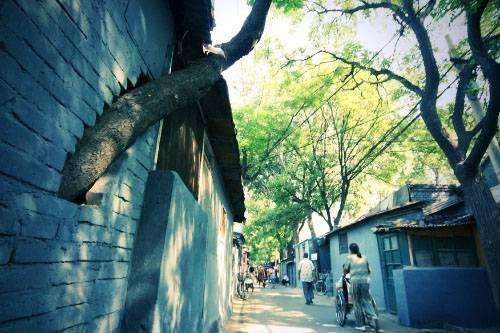
Travel Tips:
Adress: Dongcheng district
Transportation: Bus 103, 104, 108, 111, 420, 614 to Dengshixikou
Surrounding attractions: Wangfujing Avenue, St. Joseph's Wangfujing Church
Dongjiaominxiang
Extending from East Tian'anmen Square Road in the west to Chongwenmennei Avenue in the east, Dongjiaominxiang, over 3,000 meters long, is the longest hutong in Beijing and was called Beijing's "Embassy Row" in the early 20th century. The architecture along this alley presents a different style to most hutong. Since the Ming Dynasty (1368-1644), it has been used to receive foreign ambassadors. After the Second Opium War (1856-60), ministers from Britain, France and the United States came to live in the houses that had belonged to princes and rich families. Many buildings were demolished in the development of the city from 1980. However, the alley is now protected by the Beijing municipal government as a historic legacy. Bank buildings, the French hospital and a Gothic Catholic cathedral built in 1901 still remain.
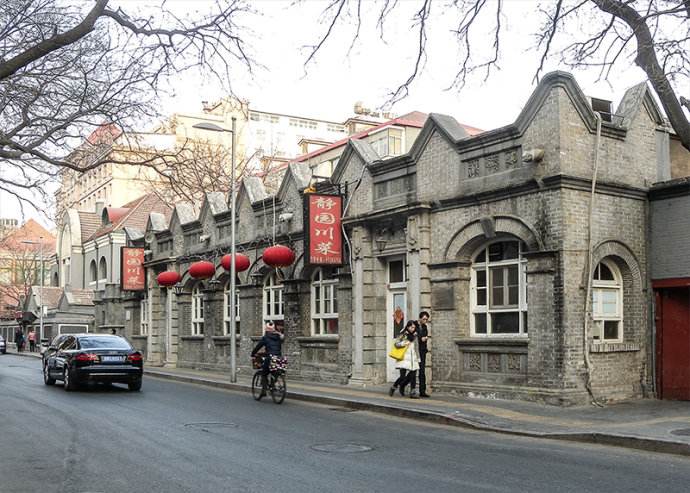
Travel Tips:
Adress: West of Tian'anmen Square
Transportation: Bus 9, 673, 692, 723, 729 to Chongwenmenxi
Surrounding attractions: Tian'anmen Square, Dongjiaominxiang Church, Laoshe Tea House
Xijiaominxiang
Xijiaominxiang was first built in the Ming Dynasty (1368-1644), but became prominent about 100 years ago when several domestic and overseas banks chose to open in that location, making it the city’s original financial street. Visitors can still see the architecture of old banks there, including the former sites of the Central Bank, China Agriculture and Industry Bank and Mainland Bank.
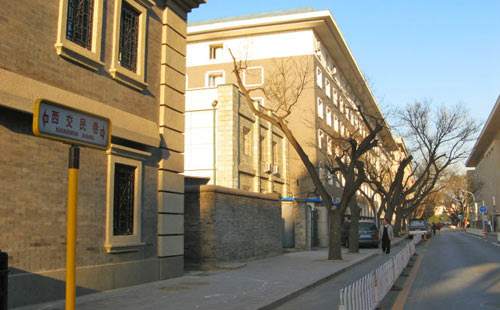
Tips:
Adress: Southern part of Xicheng District
Transportation: Bus 9, 44, 67, 301, 608, 673, 901 to Qianmenxi
Surrounding attractions: Tian'anmen Square, Qianmen Street, China Numismatic Museum
Ju'er Hutong
It was first built in the Yuan Dynasty (1206-1368) and is more than 400 meters long. During the Qing Dynasty (1644-1911), Ju'er Hutong was a gathering place for people of the Xiang Huang Division (an upper class group of the eight divisions commanded by the emperor). And No. 3, 5 and 7 houses are the former residence of Rong Lu, a provincial governor and right-hand man of Empress Dowager Cixi.
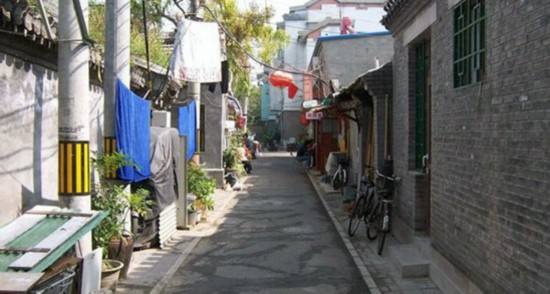
Travel Tips:
Adress: Northwest of Dongcheng District
Transportation: Bus 104, 108, 113, 612, 758 to Jiaodaokounan
Surrounding attractions: Nanluoguxiang, Yonghegong Lama Temple
Bada Hutong
During the Qing Dynasty (1644-1911), Bada Hutong was notorious as the city's biggest "red light district", housing more than 2,000 brothels. The structure of each brothel varied, and all were different from ordinary houses. After 1949, many brothels were turned into hotels and/or residences.
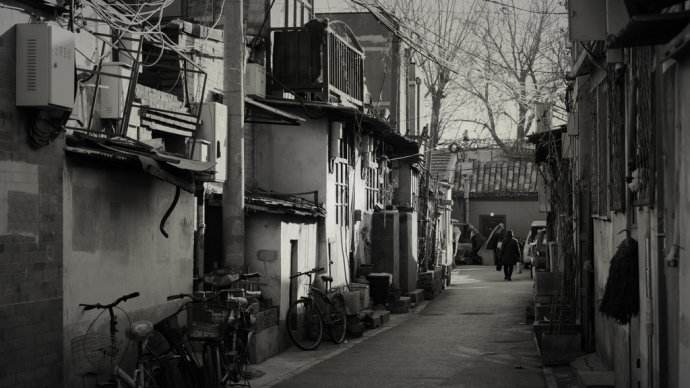
Travel Tips:
Adress: Xicheng District
Transportation: Bus 5, 23, 34, 48, 57, 715 to Hufangqiaolukoudong
Surrounding attractions: Dashila, Qianmen Street, Liulichang
Hutong Culture
Hutongs represent an important cultural element of the city of Beijing. Thanks to Beijing's long history and status as capital for six dynasties, almost every hutong has its anecdotes, and some are even associated with historic events. In contrast to the court life and elite culture represented by the Forbidden City, Summer Palace, and the Temple of Heaven, the hutongs reflect the culture of grassroots Beijingers. The hutongs are residential neighborhoods which still form the heart of Old Beijing. A virtual tour of one of Beijing's Hutong's can be found.
Tour The Beijing Hutongs with Beijing Private Tour
We will provide a private & spacious car and a local professional tour guide with over 5 years guiding experience only work for you or your group. You will be escorted during your tour. Transport, ticket, and dining (At some local restaurants popular with locals) all we will arrange for you according your requirements. Please check our most popular Beijing Tours including The Beijing Hutongs as below:
{????}
Are the above sample tour programs not suitable for you? We have more Beijing tours. Our tours can be tailor-made based on your requirements and budget to create unique Beijing experiences that allow you to interact with the local people and culture. Our enthusiastic tour expert will promptly reply you in details within 24 hours.
Prev: Water Cube
Next: Wangfujing Street
1. When is Nanluoguxiang Hutong Opening hours? Is possible to visit during the night?
It is possible to visit the Nanluoguxiang at night since the hutong opens all the way, but we highly suggest you visit the Nanluoguxiang Hutong after 10am and before 10pm. There are many shops will closed around 9:30pm. Some restaurants and bars may past mid night to 1 or 2am. You can go to visit this hutong in the morning or the late night if you want to skip the crowds, it is one of the most famous hutongs and shopping streets in Beijing.
2. Will be easy to visit Nanluoguxiang Hutong on my own or need to book a tour guide?
Yes, it will be easy to visit the Nanluoguxiang on your own by public transportation, you can take the taxi or Beijing subway to reach the street. The street is about 800 meter long with 2 sides full of small shops and restaurants, you just follow the people walk into the main street once you get there. But there are some other attractions nearby that featured with the culture and history, highly recommend you book a tour package or tour guide to take you visit the area nearby the Nanluoguxiang hutong when you travel to Beijing.
3. Is Nanluoguxiang Hutong Area a good place for the Bar Hopping at Nights?
Yes, definitely. Nanluoguxiang is also known as the third most popular bar street in Beijing. The bars here are usually small ones, but attractive and warm. Usually, local youn people or foreign visitors come to this place to have fun. There are a lot of interesting restaurants, bars, coffee shops and shops there. The most popular bars in Nanluoguxiang hutong are 16 MM Bar, Hongtongr Bar, Lao Wu Bar, Pass by Bar and more.
Taking the traditional rickshaw is the most popular and interesting way to go around the narrow alley when you take a visit to the Nanluoguxiang hutong. There are some place where you can hire a rickshaw, such as near the Drum Tower, Nanluoguxiang or Sichahai Area. Actually, you can see many rickshaw nearby the hutong. Getting on a rickshaw will make your trip much easier as the drivers are the eyes and noses of the city and know where to take you on the adventure. There are different rickshaw ride route for you choose and the hutong rickshaw market is controlled and operated by hutong travel agencies so the fare is fairly transparent. But still be careful when you book. Avoid using independent rickshaw drivers and avoid directly negotiating prices with them.
5. What are the top things to do in Nanluoguxiang Hutong?
Nanluoguxiang known as the most popular hutong for the domestic and western tourists, but it's truely a good place to taste the authentic Beijing culture. When you travel to Nanluoguxiang hutong, you can do some shopping for the Chinese handcrafts and souvenirs, there are many shops along the street; You can try lots of the various local snacks, a good thing to do if you are interested in the food culture of Beijing; Pay a visit traditional chinese courtyard and have the local family visit, you will know about the Beijing hutong culture and get a deep understanding of the people's daily life here; What's more, experience the traditional rickshaw ride to go around the zigzag lane in Hutong, it is the most popular and fun way to visit Nanluguxiang hutong with your family or friends.
The hutong is so common in Beijing that you might get the feeling that seeing one is seeing them all. The difference for the Nanluoguxiang hutong is a retail paradise along with being primarily residential. Running for about a half-mile from East Gulou Street to Di’anmen East Street in the city’s Dongcheng district, the founding the hutong and its surrounding neighbourhood date back to the middle 18th century. As a result, the alley is lined with a variety of structures that typify the ancient architecture of the Yuan Dynasty. There are literally dozens of small shops next to galleries and family-run restaurants ranging from the very traditional to the ultra-modern.
Yes, the cooking tour near the Nanluoguxiang hutong is available. We provide the great opportunity to learn about local food culture and the daily food at local family, learn how to cook from the owner. You can learn how to make Chinese dumpling, Jiao Zi in chinese. If you book the Nanluguxiang hutong cooking tour with us, our guide will pick you up from your hotel and show you around the hutong with a detailed explaination.
8. How much is the Nanluoguxiang hutong ticket? How does it take to visit the Nanluoguxiang?
Nanluoguxiang hutong is free open for public, there is no entrance tickets for visiting this place. As for the time for visiting, it all depens on how to visit, walking, cycling or rickshaw ride, the visiting time is different. Normally, it takes 1-3 hours to visit here. If you just wander around casually, half an hour is enough.
It is convenient to get to Beijing west train station from Nanluoguxiang hutong area. The distance between them is about 15KM, it takes about half an hour by driving. You can take taxi or subway to reach the train station on your own after the tour. Taxi is the most convenient way for you, just ask a taxi near the Nanluoguxiang hutong, shows your destination to the driver, they will take you the train station directly; If you want to avoid the rush hour or traffice, subway is a good option, but need a transit. You can take line 6 from Nanluoguxiang station, then transfer to line 8 at the South of Baishiqiao station, get off at the Beijing West Train Station.
Yes, Nanluoguxiang hutong and other tourist spots, such as Forbidden city, Temple of Heaven, Great Wall are much more busy during the Chinese holidays. If you will travel to Beijing during the golden week and want to visit the Nanluoguxiang hutong, you can visit this place before the crowds come here, or late evening. Normally, 12:00pm-19:00pm is the busiest time to visit Nanluoguxiang.
Duration:7-8 Hours
Attractions(Cities):Tiananmen Square, Forbidden City, Temple of Heaven, Summer Palace
Tour Style:Experience the heart of Beijing on this one-day tour, designed to immerse you in the city’s rich history, culture, and beauty. Visit iconic landmarks such as Tiananmen Square, the Forbidden City, the Temple of Heaven, and the Summer Palace. Each site offers a unique glimpse into China’s imperial past, with expert guides sharing captivating stories and insights that bring history to life. As you explore, you’ll gain a deeper understanding of Beijing’s cultural heritage, from its grand palaces to its tranquil gardens. This Beijing tour offers personalized service, ensuring a comfortable and seamless experience. Whether you're a first-time visitor or returning to explore more, this tour is the perfect way to discover Beijing’s timeless treasures in a single, unforgettable day.
Duration:2 Days, 1 Night
Attractions(Cities):Temple of Heaven, Tiananmen Square, Forbidden City, Nanluoguxiang, Mutianyu Great Wall, Summer Palace
Tour Style:Embark on a fascinating 2-day adventure in Beijing, where history and modernity blend seamlessly. Begin with the majestic Temple of Heaven and the iconic Tiananmen Square, before discovering the grandeur of the Forbidden City, an imperial treasure trove. Explore the lively Nanluoguxiang, where traditional architecture meets vibrant city life. On day two, enjoy breathtaking views from the Mutianyu Great Wall, a marvel of ancient engineering, and immerse yourself in the serene beauty of the Summer Palace, with its lush gardens and elegant pavilions. This thoughtfully crafted tour offers the perfect mix of historical insights and cultural experiences, designed to captivate your senses and spark your curiosity, leaving you with lasting memories of Beijing.
Duration:3 Days, 2 Nights
Attractions(Cities):Tiananmen Square, Forbidden City, Temple of Heaven, Jingshan Park, Summer Palace, Kunming Lake Boat Riding, Nanluoguxiang, Panjiayuan Antique Market, Mutianyu Great Wall, Bird's Nest, Water Cube
Tour Style:Immerse yourself in Beijing’s rich history and vibrant culture with our exclusive 3-day private tour. Start by exploring Tiananmen Square and the majestic Forbidden City, then visit the serene Temple of Heaven. Enjoy sunset views from Jingshan Park and a scenic boat ride on Kunming Lake at the Summer Palace. Wander through the lively Nanluoguxiang Hutong, hike the breathtaking Mutianyu Great Wall, and marvel at the modern Bird’s Nest and Water Cube. This personalized tour seamlessly blends historical landmarks, cultural experiences, and stunning architecture, ensuring an unforgettable journey. Every moment is designed to captivate, inspire, and leave you with lasting memories of Beijing’s unique charm and diverse beauty.
Duration:5 Days, 4 Nights
Attractions(Cities):Mutianyu Great Wall, Bird's Nest, Water Cube, Qianmen Street, Morning Market, Forbidden City, Tiananmen Square, Jingshan Park, Temple of Heaven, Nanluoguxiang, Facial Makeup Painting, 798 Art Zone
Tour Style:Immerse yourself in Beijing’s rich culture and history with our comprehensive Beijing tour package. This thoughtfully crafted itinerary takes you to iconic landmarks such as the Mutianyu Great Wall, Forbidden City, and Tiananmen Square, alongside modern architectural wonders like the Bird’s Nest and Water Cube. Experience local life at Qianmen Street and the Morning Market, and discover the city’s vibrant art scene at the 798 Art Zone. Engage in hands-on activities, including traditional facial makeup painting. With expert guidance from a seasoned Beijing travel expert, this tour seamlessly combines historical exploration with cultural immersion, offering an unforgettable Beijing experience. Each moment is designed to leave you with lasting memories of this dynamic city.
Duration:10+ Hours
Attractions(Cities):Terracotta Warriors Museum
Tour Style:Embark on a captivating day trip from Beijing to Xi'an to explore the iconic Terracotta Warriors. This Beijing-Xi'an tour offers a fascinating journey through ancient Chinese history, highlighting the world-renowned Terracotta Army. Visit this monumental archaeological site, home to thousands of life-sized soldiers, horses, and chariots, each crafted with intricate details. With the guidance of an expert, learn about the historical significance of these remarkable figures and their role in China’s ancient imperial past. Enjoy seamless travel and smooth logistics, ensuring a stress-free experience as you delve into the history and culture of this extraordinary site. This day trip promises an enriching and memorable exploration of one of China’s most treasured landmarks.
Wechat: Chinaprivatetour
24 Hours Hotline:
+86 137-3541-1378
(Your Privacy is Protected)
1 to 1 tailor-made service from our professional travel advisors for the most sophisticated
Constantly excellent reviews for attraction, hotel and service Competitive price
Local experts provide quality tours Best selected knowledgeable local guides Authentic local restaurants
7*24 hours available to create you a worry-free tour. No Hidden Fees and absolutely no pressure to buy. Secured









Copyright © 2017 Chinabeijingprivatetour.com All rights reserved. 浙ICP备18056007号-2